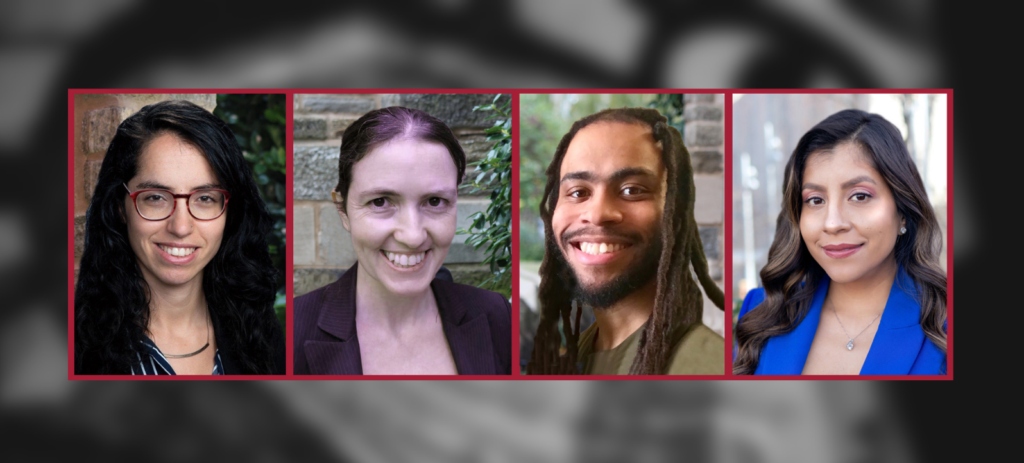[From left to right: Professors Gilat Bachar, Edith Beerdsen, Zamir Ben-Dan, and Evelyn Rangel-Medina]
Temple University Beasley School of Law is proud to announce the appointments of four new members of the law school faculty. Gilat Bachar, Edith Beerdsen, Zamir Ben-Dan, and Evelyn Rangel-Medina will join the Temple Law community starting in the fall 2022 semester. Their expertise, experience, and scholarship add to the rich intellectual life of the law school and offer exciting new curricular opportunities for our students.
“I’m proud to welcome my new colleagues to Temple Law School,” said interim Dean Rachel Rebouché. “They are each exciting legal thinkers in their own right. We look forward to the rich diversity they will bring to the academic discourse of the law school and the impact they will have on our community and students.”
Professor Gilat Bachar joins Temple Law from Villanova University Charles Widger School of Law, where she served as a Visiting Assistant Professor teaching Contracts and Dispute Resolution. Prior to coming to Villanova, Bachar was a research fellow with the Stanford Center on the Legal Profession and a Stanford Law School Postgraduate Public Interest Fellow at the Center for Justice & Accountability in San Francisco where she worked on social justice tort litigation in federal courts.
“I am thrilled and truly honored to be joining Temple University Beasley School of Law,” said Professor Bachar. “Temple Law is a dynamic law school, with an outstanding faculty, a vibrant scholarly community, a robust commitment to experiential learning, numerous outstanding specialty programs, wonderful students, and great staff members. As an interdisciplinary scholar who seeks to tackle injustices by using private law mechanisms, Temple Law will be a great home for me given the school’s deep social justice commitments and the many ways the School plays a positive role in society—in Pennsylvania and beyond.”
Prior to joining the Temple Law faculty, Edith Beerdsen taught in the Lawyering Program at NYU School of Law. Her work has been published (or is forthcoming) in the Cornell Law Review, Georgia Law Review, and numerous peer-reviewed scientific journals. Her research focuses on the ways in which civil litigants gather and exchange evidence, how institutional structures supplied by rules and the judiciary shape these processes, and how they interact with norm-based practices and discovery technology.
Professor Beerdsen began her legal career as a litigator at Davis Polk & Wardwell LLP in New York City, where for eight years she represented individuals, corporations, and non-profit organizations in a wide variety of civil actions, with a particular focus on the creation and presentation of scientific and statistical evidence by expert witnesses. Prior to law school, she was a computational chemist and used computer simulations and statistical models to study molecular movement.
“I am thrilled to be joining the Temple Law community,” she noted. “I look forward to meeting and working with Temple’s students and to being a part of the school’s vibrant scholarly community.”
Professor Zamir Ben-Dan’s research interests and emerging scholarship lie in the intersections of criminal law, race and the law, and American history. Professor Ben-Dan joins Temple Law after serving as the Interim Director of the Fulltime Lawyering Seminar Program at the CUNY School of Law.
Prior to his work at CUNY, Professor Ben-Dan taught as an adjunct professor in the Black and Latino Studies Department at Baruch College, worked with the Community Justice Unit, where he provided wrap-around legal services to participants in non-profit organizations that do Cure Violence work, and was a staff attorney with the Legal Aid Society in New York City in the Bronx Criminal Trial Practice. Professor Ben-Dan was a founding member of the Black Attorneys of Legal Aid caucus (BALA), an amalgamation of over 100 Black Legal Aid lawyers that advocates for racial justice both within and without the Legal Aid Society and served in BALA leadership for nearly five years. An innovative creator of curriculum, he created a practitioner course through the National Association for Public Defense called “Warrior Motion Practice,” teaching a methodical approach to creative motion writing as a means of addressing social wrongs.
“With growing demand for a more just society, legal academia must transform to meet the changing times,” said Professor Ben-Dan. “I very much look forward to joining the esteemed faculty at the Temple Beasley School of Law during this exciting time, and I hope to help shift legal education and craft today’s students into tomorrow’s lawyers and social justice leaders.”
“As a formerly undocumented Indigenous woman, I am thrilled to lend my voice and talents to not only filling the experiential void due to a lack of representation of people like me in legal academia but also to use my research to interrogate how people like me have been made purposely invisible through the construction of legal frameworks,” said Professor Evelyn Rangel-Medina, who joins Temple Law from the University of California, Hastings College of the Law, where she served as the inaugural Visiting Assistant Professor of the Center for Racial and Economic Justice teaching Criminal Procedure, Latinx & the Law, and Citizenism: Race & Immigration. “I am excited to work with the students at Temple Beasley School of Law and prepare them to serve underrepresented clients and communities through an in-depth intersectional lawyer training.”
Her scholarship is primarily in race and the law, employment discrimination, criminal procedure, and constitutional law. Her research investigates racial subordination and its various iterations, including identifying the myriad ways documentation status enforcement and national security policies discriminatorily impact Black, Indigenous and People of Color (BIPOC). Professor Rangel-Medina previously worked as a managing director at United for Respect and Restaurant Opportunities Centers United (ROC United) advancing labor and employment advocacy campaigns and providing resources to low-wage workers.

